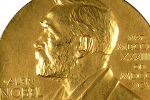 WIKIMEDIA, THOMAS FISHER RARE BOOK This year’s Nobel Prize for Physiology or Medicine goes to cognitive neuroscience John O’Keefe of University College London, who takes one half of this year’s prize for his work identifying place cells, while husband-and-wife team May-Britt and Edvard Moser, both professors at the Norwegian University of Science and Technology (NTNU), will share the second half for their discovery of so-called grid cells. Together, the Laureate’s work paved the way for identifying an inner positioning system within the brain.
WIKIMEDIA, THOMAS FISHER RARE BOOK This year’s Nobel Prize for Physiology or Medicine goes to cognitive neuroscience John O’Keefe of University College London, who takes one half of this year’s prize for his work identifying place cells, while husband-and-wife team May-Britt and Edvard Moser, both professors at the Norwegian University of Science and Technology (NTNU), will share the second half for their discovery of so-called grid cells. Together, the Laureate’s work paved the way for identifying an inner positioning system within the brain.
In chemistry, Eric Betzig of the Howard Hughes Medical Institute’s Janelia Farm Research Campus, Stefan Hell of the Max Planck Institute for Biophysical Chemistry and the German Cancer Research Center, and William Moerner of Stanford University will share the 2014 Nobel Prize equally “for the development of super-resolved fluorescence microscopy,” which has allowed scientists to “study living cells in the tiniest molecular detail,” the Nobel Foundation said in its press release announcing the award.
 WIKIMEDIA, WHATIGUANAMutations in a mother mouse’s mitochondrial DNA can affect her offspring, according to research published this week (October 9) in Scientific Reports. Specifically, those pups that inherited mitochondrial DNA mutations from their mom’s eggs had approximately one-third shorter lives.
WIKIMEDIA, WHATIGUANAMutations in a mother mouse’s mitochondrial DNA can affect her offspring, according to research published this week (October 9) in Scientific Reports. Specifically, those pups that inherited mitochondrial DNA mutations from their mom’s eggs had approximately one-third shorter lives.
“The overriding importance of this kind of work is the demonstration that the mitochondrial DNA, which is maternally inherited, carries the genetic information that can be ...














